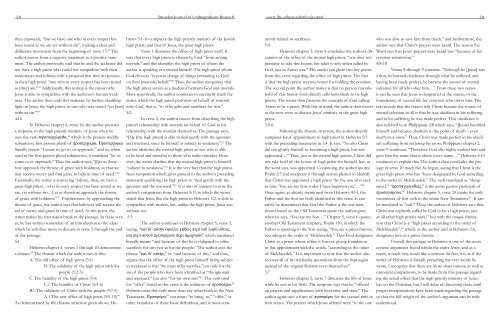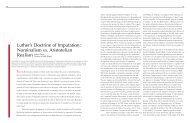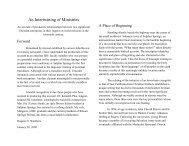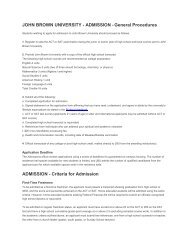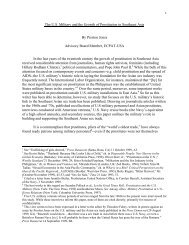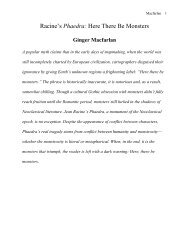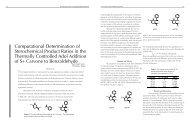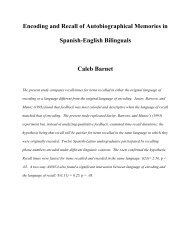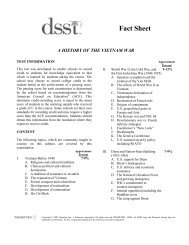Hebrews 4:14-5:10: Jesus, The Great High Priest Patton Shinall
Hebrews 4:14-5:10: Jesus, The Great High Priest Patton Shinall
Hebrews 4:14-5:10: Jesus, The Great High Priest Patton Shinall
- No tags were found...
You also want an ePaper? Increase the reach of your titles
YUMPU automatically turns print PDFs into web optimized ePapers that Google loves.
58 Broaden Journal of Undergraduate Reseachwww.jbu.edu/academics/journal59then expounds, “but we have one who in every respect hasbeen tested as we are yet without sin”, making a clear anddeliberate movement from the beginning of verse 15. 42 <strong>The</strong>author moves from a negative statement to a positive statement.<strong>The</strong> author previously said that he and the audience didnot have a high priest who could not sympathize with theirweaknesses and follows with a proposal that they do possessin their high priest “one who in every respect has been testedas [they] are.” 43 Additionally, this testing is the reason why<strong>Jesus</strong> is able to sympathize with the audience’s human weakness.<strong>The</strong> author then ends this sentence by further sheddinglight on <strong>Jesus</strong>, the high priest, as one who was tested “yet [was]without sin.” 444:16In <strong>Hebrews</strong> chapter 4, verse 16, the author presentsa response to the high priestly ministry of <strong>Jesus</strong> when heuses the verb προσερχώμεθα, 45 which is the present middlesubjunctive first person plural of προσερχομαι. Προσερχομαιliterally means “I come to, go to, or approach,” and so, whenused in the first person plural subjunctive, it translates “let uscome to or approach.” Thus the author says, “[l]et us thereforeapproach the throne of grace with boldness, so that wemay receive mercy and find grace to help in time of need.” 46Essentially, the writer is conveying “[s]ince, then, we have agreat high priest…who in every respect has been tested as weare, yet without sin…Let us therefore approach the throneof grace with boldness.” 47 Furthermore, by approaching thethrone of grace, the author says that believers will receive theaid of mercy and grace in time of need. At this point, thewriter makes his first major break in the passage. In these verses,he has written somewhat of an introduction to the ideaswhich he will then move to discuss in verse 5 through the endof the passage.5:1<strong>Hebrews</strong> chapter 5, verses 1 through <strong>10</strong> demonstratea chiasm. 48 <strong>The</strong> chiasm which the author uses is this:A. <strong>The</strong> old office of high priest (5:1)B. <strong>The</strong> solidarity of the high priest with thepeople (5:2-3)C. <strong>The</strong> humility of the high priest (5:4)C.1 <strong>The</strong> humility of Christ (5:5-6)B.1 <strong>The</strong> solidarity of Christ with the people (5:7-8)A.1 <strong>The</strong> new office of high priest (5:9-<strong>10</strong>) 49As demonstrated by the chiastic structure given above, <strong>Hebrews</strong>5:1-<strong>10</strong> compares the high priestly ministry of the Jewishhigh priest, and that of <strong>Jesus</strong>, the great high priest.Verse 1 discusses the office of high priest itself. Itsays that every high priest is chosen by God “from amongmortals,” and this identifies the high priest of whom theauthor is speaking as a mortal himself. <strong>The</strong> high priest whomGod chooses “is put in charge of things pertaining to Godon their [mortals] behalf.” 50 Thus, the author recognizes thatthe high priest serves as a mediator between God and mortals.More specifically, the author continues to succinctly mark theduties which the high priest performs on behalf of mortalsunto God, that is, “to offer gifts and sacrifices for sins.”5:2In verse 2, the author moves from describing the highpriest’s relationship with mortals on behalf of God to hisrelationship with the mortals themselves. <strong>The</strong> passage says,“[h]e [the high priest] is able to deal gently with the ignorantand wayward, since he himself is subject to weakness.” 51 <strong>The</strong>author identifies the mortal high priest as one who is ableto be kind and merciful to those who make mistakes. However,the writer clarifies that the mortal high priest is himself“subject to weakness.” 52 It is the very fact that the high priestfaces temptation which gives ground to the author’s precedingstatement qualifying the high priest to “deal gently with theignorant and the wayward.” 53 It is also of interest to note theauthor’s comparison from <strong>Hebrews</strong> 5:15 in which the writerstated that <strong>Jesus</strong>, like the high priest in <strong>Hebrews</strong> 5:2, is able tosympathize with sinners, but, unlike the high priest, <strong>Jesus</strong> waswithout sin.5:3<strong>The</strong> author continues in <strong>Hebrews</strong> chapter 5, verse 3,saying, “καὶ δι’ αὐτὴν ὀφείλει καθὼς περὶ τοῦ λαοῦ οὕτωςκαὶ περὶ αὐτοῦ προσφέρειν περὶ ἁμαρτιῶν” which translatedliterally means “and because of this he is obligated to offersacrifices for sins just as for the people.” <strong>The</strong> author uses thephrase “καὶ δι’ αὐτὴν,” or “and because of this,” and thus,argues that the effect of the high priest himself being subjectto weakness is that “he must offer sacrifice,”not only for thesin of the people who have been identified as “the ignorantand wayward, 54 but also “for his own sins” 55 . <strong>The</strong> verb usedfor “offer” found in this verse is the infinitive of προσφέρω. 56<strong>Hebrews</strong> uses this verb more than any other book in the NewTestament. Προσφέρω 57 can mean “to bring to,” “offer,” orother variations of these basic definitions, and is most commonlyrelated to sacrifices.5:4<strong>Hebrews</strong> chapter 5, verse 4 concludes the author’s discussionof the office of the mortal high priest, “one does notpresume to take this honor, but takes it only when called byGod, just as Aaron was.” <strong>The</strong> reader can glean two key pointsfrom this verse regarding the office of high priest. <strong>The</strong> firstis that the high priest receives honor for holding the position.<strong>The</strong> second point the author makes is that no person can takehold of this honor: God directly calls individuals to be highpriests. <strong>The</strong> writer then presents the example of God callingAaron to be a priest. With this in mind, the author then movesin the next verse to discuss <strong>Jesus</strong>’ ministry as the great highpriest.5:5-6Following the chiastic structure, the author directlycompares <strong>Jesus</strong>’ appointment to high priest in <strong>Hebrews</strong> 5:5with the preceding statements in 5:4. It says, “So also Christdid not glorify himself in becoming a high priest, but wasappointed…” Thus, just as the mortal high priests, Christ didnot take hold of the honor of high priest for himself, but, asthe word says, was appointed. Continuing, the author quotesPsalm 2:7 and interprets it through sensus plenior to identifythat Christ was appointed a high priest “by the one who saidto him, ‘You are my Son, today I have begotten you’…” 58Once again, as already mentioned from <strong>Hebrews</strong> 4:<strong>14</strong>, theFather and the Son are both identified in this verse. It cansafely be determined that God the Father is the one mentionedbased on the Old Testament quote the author giveswhen he says, “You are my Son…” Chapter 5, verse 6 quotesanother Old Testament scripture, Psalm 1<strong>10</strong>, in which theFather is speaking to the Son saying, “You are a priest forever,according to the order of Melchizedek.” Thus God designatesChrist as a priest whose office is forever, giving foundationto this appointment with the words, “according to the orderof Melchizedek.” It is important to note that the author alsoreceives all of his midrashic quotations from the Septuagintinstead of the original Hebrew texts themselves 59 .5:7<strong>Hebrews</strong> chapter 5, verse 7 discusses the life of <strong>Jesus</strong>while he was in his flesh. <strong>The</strong> scripture says that he “offeredup prayers and supplications with loud cries and tears.” <strong>The</strong>author again uses a form of προσφέρω for the second time infour verses. <strong>The</strong> prayers which <strong>Jesus</strong> offered were “to the onewho was able to save him from death,” and furthermore, theauthor says that Christ’s prayers were heard. <strong>The</strong> reason theWord says that <strong>Jesus</strong>’ prayers were heard was “because of hisreverent submission.”5:8-<strong>10</strong>Verses 8 through 9 continue. “Although he [<strong>Jesus</strong>] wasa Son, he learned obedience through what he suffered, andhaving been made perfect, he became the source of eternalsalvation for all who obey him…” From these two versesit can be seen that <strong>Jesus</strong> is designated as the source, or thefoundation, of eternal life for everyone who obeys him. <strong>The</strong>text reveals that the reason why Christ became the source ofeternal salvation to all is that he was obedient in his sufferingand in his suffering he was made perfect. This obedience isalso referred to in Philippians 2:8 which says, “[<strong>Jesus</strong>] humbledhimself and became obedient to the point of death – evendeath on a cross.” Thus, Christ was made perfect in his obedientsuffering from enduring his cross. Philippians chapter 2,verse 9 continues, “<strong>The</strong>refore God also highly exalted him andgave him the name that is above every name…” <strong>Hebrews</strong> 5:<strong>10</strong>continues to explain this. <strong>The</strong> author then concludes the passagein verse <strong>10</strong> much like he began, saying that Christ is thegreat high priest who has “been designated by God accordingto the order of Melchizedek.” <strong>The</strong> verb translated as “designated,”“προσαγορευθεὶς,” is the aorist passive participle ofπροσαγορεύω. 60 <strong>Hebrews</strong> chapter 5, verse <strong>10</strong> marks the onlyoccurrence of this verb in the entire New Testament. 61 It canbe translated as “call. 62 Thus, the author of <strong>Hebrews</strong> says thatChrist was explicitly called by God to be a high priest, justas all other high priests were, 63 but with the unique distinctionthat Christ is a “high priest according to the order ofMelchizedek”, 64 which, as the author said in <strong>Hebrews</strong> 5:6,designates him as a priest forever.Overall, this passage in <strong>Hebrews</strong> is one of the mostconcise arguments found within the entire letter, and as aresult, it reads very much like a sermon. In fact, it is as if thewriter of <strong>Hebrews</strong> is literally preaching the very words hewrote. I recognize that there are more observations, as well ascanonical comparisons, to be made from this passage regardingthe actual effect that the high priestly ministry of <strong>Jesus</strong>has on the Christian, but I will delay in discussing these untilproper interpretations have been made regarding the passageso that the full weight of the author’s argument can be trulyunderstood.


